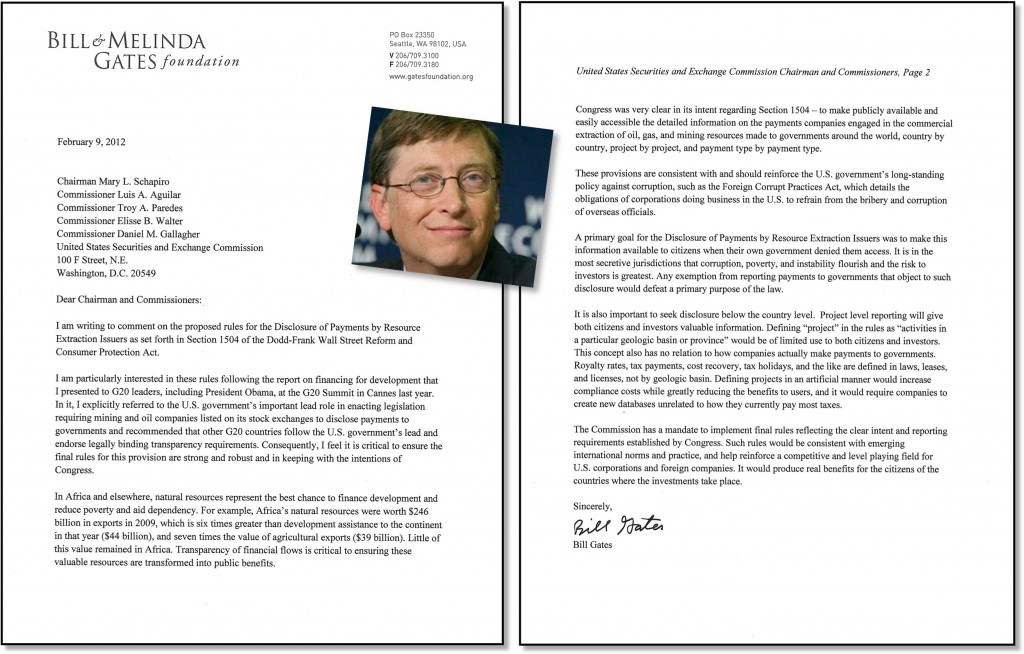It was only about 12 years ago that Bill Gates was testifying in legal depositions to federal suits of illegal business practice designed to ensure Microsoft’s competitive advantage in the PC marketplace. However, after leaving daily running of the company in 2008, Gates has become a global philanthropist of note, and has seemingly come to understood how some business decisions and pursuits of competitive advantage are not always to the benefit of people far from corporate board rooms and shareholder meetings.

Case in point is his joining the call already led by the Publish What You Pay Coalition and other leading international NGOs (such as Oxfam, and the ONE Campaign), which is focused on strong transparency regulations for extractive industries like oil, mining and forestry around the world. Gates and these groups are concerned about poor nations that often fall prey to a “resource curse” that results when dictators or corrupt government bureaucrats begin stealing or hiding enormous amounts of money for themselves when a nation opens itself up to corporate multinationals who bring these industries to their nation.
At the heart of the campaign right now is a lobbying push directed at the Securities and Exchange Commission (SEC). The board of the SEC is set to soon forge rules designed to enforce the Cardin-Lugar Amendment (Section 1504) of the comprehensive Dodd-Frank Wall Street Reform and Consumer Protection Act. The measure is intended to force many companies to provide information on payments for production licenses, taxes, royalties and other aspects of energy and mineral projects.
But as is reported in the Houston Chronicle this week, the American Petroleum Institute is aligned on the other side. API is actively seeking disclosure exceptions arguing it puts them at a disadvantages particularly against foreign, state-owned, oil companies.
But Gates some excerpts in his recently released letter (PDF) outlines a strong case for following the full intent of the law.
“…I feel it is critical to ensure the final rules for this provision are strong and robust and in keeping with the intentions of Congress.
In Africa and elsewhere, natural resources represent the best chance to finance development and reduce poverty and aid dependency. For example, Africa’s natural resources were worth $246 billion in exports in 2009, which is six times greater than development assistance to the continent in that year ($44 billion), and seven times the value of agricultural exports ($39 billion). Little of this value remained in Africa. Transparency of financial flows is critical to ensuring these valuable resources are transformed into public benefits.
Congress was very clear in its intent regarding Section 1504 – to make publicly available and easily accessible the detailed information on the payments companies engaged in the commercial extraction of oil, gas, and mining resources made to governments around the world, country by country, project by project, and payment type by payment type.
These provisions are consistent with and should reinforce the U.S. government’s long-standing policy against corruption, such as the Foreign Corrupt Practices Act, which details the obligations of corporations doing business in the U.S. to refrain from the bribery and corruption of overseas officials.
A primary goal for the Disclosure of Payments by Resource Extraction Issuers was to make this information available to citizens when their own govermnent denied them access. It is in the most secretive jurisdictions that corruption, poverty, and instability flourish and the risk to investors is greatest. Any exemption from reporting payments to governments that object to such disclosure would defeat a primary purpose of the law.”
(Source: Bill Gates Letter to SEC Board, Feb 9, 2012)
